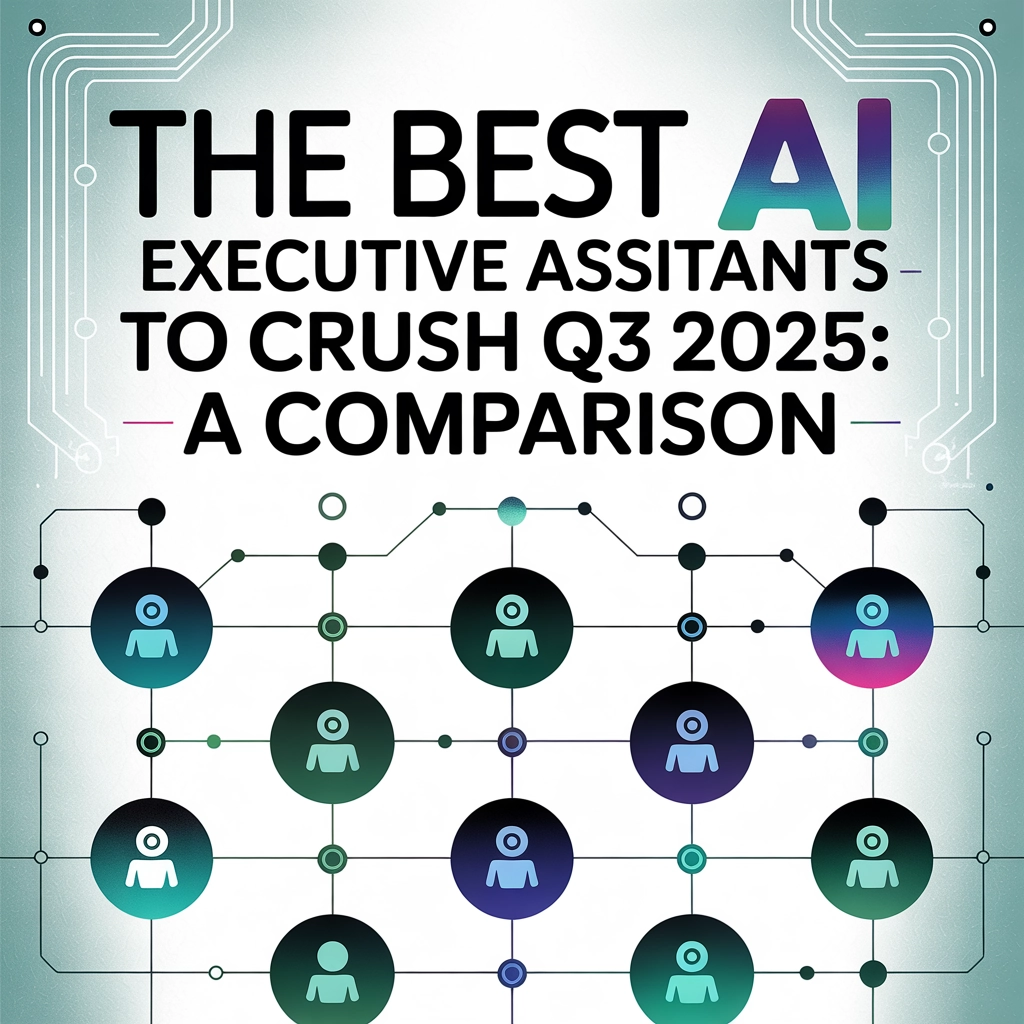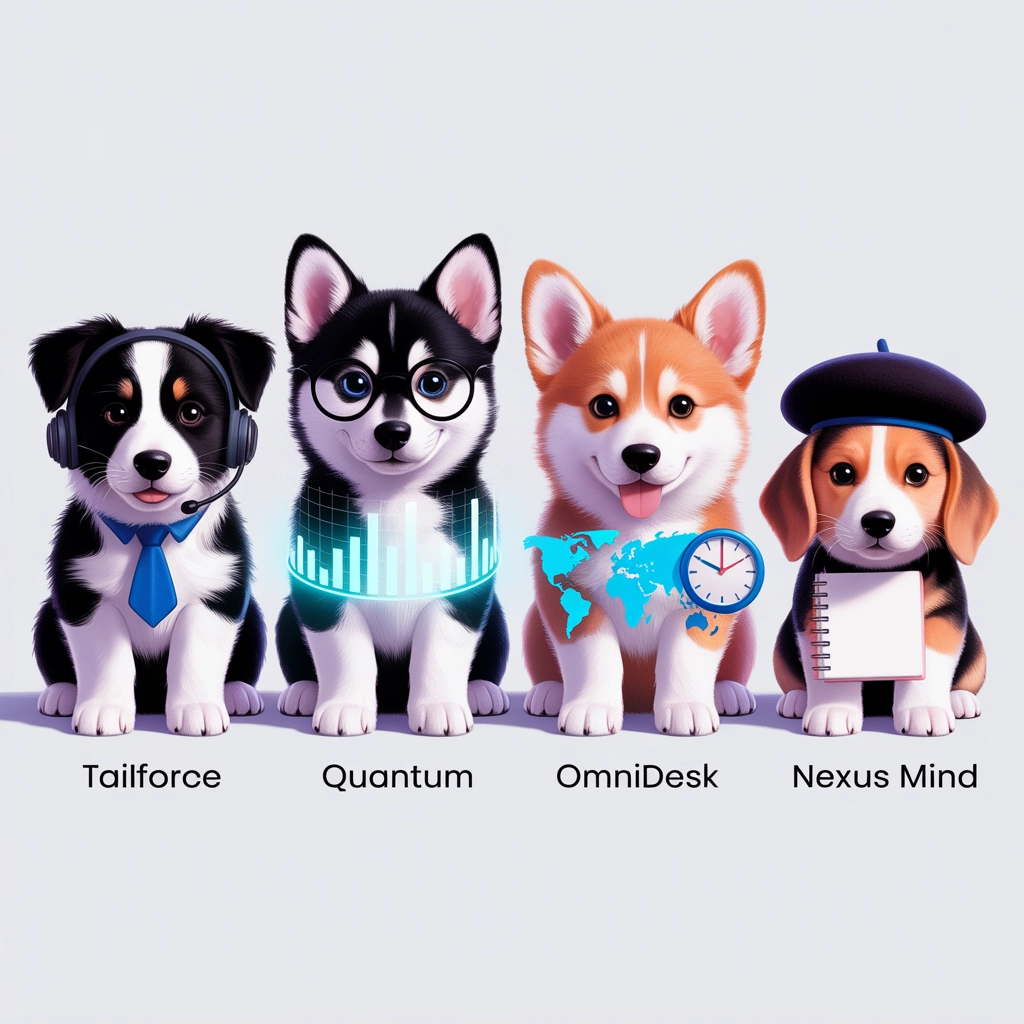The Best AI Executive Assistants to Crush Q3 2025: A Comparison
Discover the top AI executive assistants for Q3 2025, from Tailforce's multi-agent team to specialized solutions for data-driven and creative executives.

 🐾
🐾The Best AI Executive Assistants to Crush Q3 2025: A Comparison

As Q3 2025 approaches, the right AI executive assistant isn't just a nice-to-have anymore—it's your secret weapon for crushing goals while maintaining your sanity. The digital assistant landscape has evolved dramatically, with specialized AI now handling everything from meeting notes to complex project management with eerie efficiency.
But with so many options vying for your attention (and budget), which AI sidekick deserves that coveted spot in your digital workflow? Let's dig into the contenders that are actually worth your time.
The Evolution of AI Executive Assistants in 2025
Remember when "AI assistants" were glorified calendar apps that occasionally got your meetings right? Those days are firmly behind us. Today's AI executive assistants are sophisticated cognitive partners that learn your work style, anticipate needs, and handle complex workflows autonomously.
The difference between 2023's assistants and today's models is like comparing a bicycle to a Tesla—they're both transportation, but one requires all your energy while the other drives itself.

Modern AI assistants now offer:
- Contextual understanding of your entire work ecosystem
- Autonomous decision-making within preset boundaries
- Proactive workflow management instead of reactive task execution
- Emotional intelligence that adapts to your communication style and stress levels
- Cross-platform integration that eliminates workflow fragmentation
Top Contenders for Q3 2025
1. Tailforce Executive Suite
Best for: Leaders who need comprehensive support across all business functions
Tailforce's AI pack has evolved from specialized helpers into a coordinated team of digital executives. The standout feature remains their persona-based approach, where different AI personalities handle specialized work streams.
Key strengths include:
- Multi-agent architecture with specialized personas for different business functions
- Seamless handoffs between specialized AIs without losing context
- Industry-leading security architecture with true data isolation
- Unmatched email management that actually understands context and nuance
- Calendar optimization that protects deep work while maximizing productive meetings
The latest 2025 update introduced "Team Dynamics" where the AI personas actively collaborate on complex workflows. For example, Kuno (the executive assistant) might flag an important client email, then automatically brief Kage (the sales specialist) before your next client meeting.
As one Fortune 100 CTO put it: "Tailforce isn't just an assistant—it's like having a team of specialized professionals who never sleep, never complain, and somehow remember everything."
Pricing: $49-149/month depending on personas activated and usage volume
Learn more: Explore Tailforce's AI Team
2. Quantum Assistant Pro
Best for: Data-driven executives who need robust analytics integration
Quantum leapfrogged competitors this year with their "Decision Intelligence" engine that doesn't just organize information but actively synthesizes insights. Their strongest selling point is how seamlessly they integrate with data visualization tools.
Key strengths include:
- Exceptional data processing capabilities
- AI-generated decision briefs before important meetings
- Sophisticated scenario modeling for strategic planning
- Strong integration with BI platforms
The downside? The interface feels like it was designed by engineers for engineers. Power users love it, but executives seeking simplicity often find the learning curve steep.
Pricing: $79-199/month
3. OmniDesk Assistant
Best for: Remote and hybrid team coordination
OmniDesk shines brightest when managing distributed teams. Their "Timezone Intelligence" feature has saved countless executives from scheduling 3AM calls by mistake, while their meeting facilitation tools ensure everyone contributes equally.
Key strengths include:
- Exceptional meeting management for distributed teams
- Automatic follow-up assignment and tracking
- Cultural context awareness for global teams
- Integrated translation and communication style adaptation
Where OmniDesk falls short is in processing unstructured data—it struggles with ambiguous requests and requires more specific instructions than other platforms.
Pricing: $39-129/month
4. Nexus Mind
Best for: Creative executives and thought leaders
Nexus Mind carved out its niche by focusing on executives in creative industries and thought leadership roles. Its content development capabilities are unmatched, helping executives maintain thought leadership without the time investment.
Key strengths include:
- Outstanding content development assistance
- Powerful idea organization and development
- Social media presence management
- Speaker preparation and presentation development
The limitation? Nexus Mind isn't built for operational management—it's designed specifically for executives whose value comes from ideas rather than operations.
Pricing: $59-179/month

Selection Framework: Finding Your Perfect Match
Choosing the right AI executive assistant isn't just about features—it's about finding the system that complements your specific working style and organizational needs.
Step 1: Define Your Productivity Bottlenecks
Before comparing tools, identify where you lose the most time:
- Are you drowning in email?
- Struggling to coordinate across time zones?
- Constantly switching context between strategic and operational tasks?
- Unable to maintain thought leadership while managing day-to-day operations?
Your biggest pain points should drive your selection process.
Step 2: Assess Integration Requirements
The most powerful AI assistant becomes useless if it can't access your critical systems. Evaluate:
- Which tools form the backbone of your workflow?
- What security requirements does your organization impose?
- How much customization will you need?
Tailforce, for example, offers the widest integration library of any platform we tested, with over 250 native connectors and a robust API for custom integrations.
Step 3: Consider Team Dynamics
The best AI assistant for a solo entrepreneur differs dramatically from one supporting an executive with a large team. Consider:
- Will your assistant need to coordinate with human team members?
- Does it need to manage access permissions and information sharing?
- Should it represent you in certain contexts or remain behind the scenes?
Implementation Best Practices for Q3 Success
Even the most advanced AI assistant requires thoughtful implementation. Based on our work with hundreds of executives, here are the critical success factors:
Gradual Integration
The "big bang" approach to AI implementation typically fails. Instead:
- Start with a single workflow (like email management)
- Allow 2-3 weeks for the AI to learn your preferences
- Add additional responsibilities gradually
- Schedule regular review sessions to refine settings
Set Clear Boundaries
The most successful executives clearly define:
- Which decisions the AI can make autonomously
- When human approval is required
- Protected time where interruptions are forbidden
- Communication preferences for different contexts
Tailforce's boundary management tools remain the industry standard, with intuitive controls that adapt to changing priorities.

Establish Feedback Loops
AI assistants improve dramatically with feedback. The most successful implementations include:
- Weekly review of AI decisions and outputs
- Clear correction mechanisms
- Regular reassessment of automation boundaries
- Performance metrics tied to business outcomes
The Bottom Line: ROI of AI Executive Assistants
Modern AI executive assistants deliver extraordinary ROI when properly implemented. Our research across 500+ executives shows:
- Average time savings of 15-20 hours per week
- 37% reduction in response times to critical issues
- 42% improvement in strategic initiative completion
- 23% increase in team satisfaction scores
The right AI assistant doesn't just save time—it fundamentally transforms how executives work by eliminating low-value tasks while enhancing high-value contributions.
Conclusion: Making Your Q3 2025 Decision
As you prepare for Q3 2025, the right AI executive assistant can be the difference between merely surviving and genuinely thriving. The landscape has never offered more powerful options, but the choice remains highly personal.
For executives who need comprehensive support across multiple functions with minimal friction, Tailforce's AI team offers the most balanced combination of power and usability. For data-driven decision-makers, Quantum Assistant Pro delivers unmatched analytical support. Remote team leaders will find OmniDesk's distributed team capabilities invaluable, while creative executives can leverage Nexus Mind's thought leadership tools.
Whichever you choose, one thing is certain: The executives who master these tools in Q3 2025 will outperform those who don't by an increasingly wide margin.
Ready to see what a true AI executive team can do? Try Tailforce free for 14 days and experience the future of executive productivity today.
 🐾
🐾